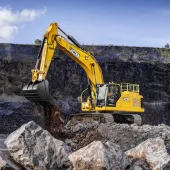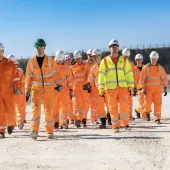Record number of contracts for JCB apprentices

Company celebrates as 79 Level 2 and 3 apprentices receive full-time contracts of employment
A RECORD-breaking group of JCB apprentices had two reasons to celebrate at the launch of National Apprenticeships Week on Monday 4 March. A total of 79 apprentices were awarded their apprenticeship certificates – at the same time as receiving coveted contracts of employment with the Staffordshire-based digger maker.
The group is the biggest in the history of JCB to graduate as Level 2 and 3 apprentices in a single year. They received their awards from JCB directors at a special graduation ceremony at JCB’s World Headquarters in Rocester.
JCB have a long history of recruiting apprentices and this year marks 55 years since the first intake of nine completed their training and were presented with their apprenticeship certificates by company founder Joseph Cyril Bamford.
JCB chief executive Graeme Macdonald said: ‘New talent joining the business is fundamental to JCB’s future growth and success; our business is growing rapidly and the apprentices are an important part of our plans for the long term.
‘Over the past five years we have invested £30 million into our training programmes with more than 700 new recruits joining the business as apprentices or graduates. Their commitment to learning has been exemplary and their hard work has paid off with the award of full-time contracts.’
JCB’s director of learning and development, Max Jeffery, said: ‘The apprentices who have been awarded full-time contracts range from age 18 to 38 and include a former professional rugby player, pub landlord and cleaner, as well former students from the JCB Academy.
‘The diversity of this year’s graduating apprentices shows this is a great route into a new and promising career – no matter what your background, age or experience.’







